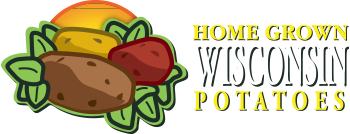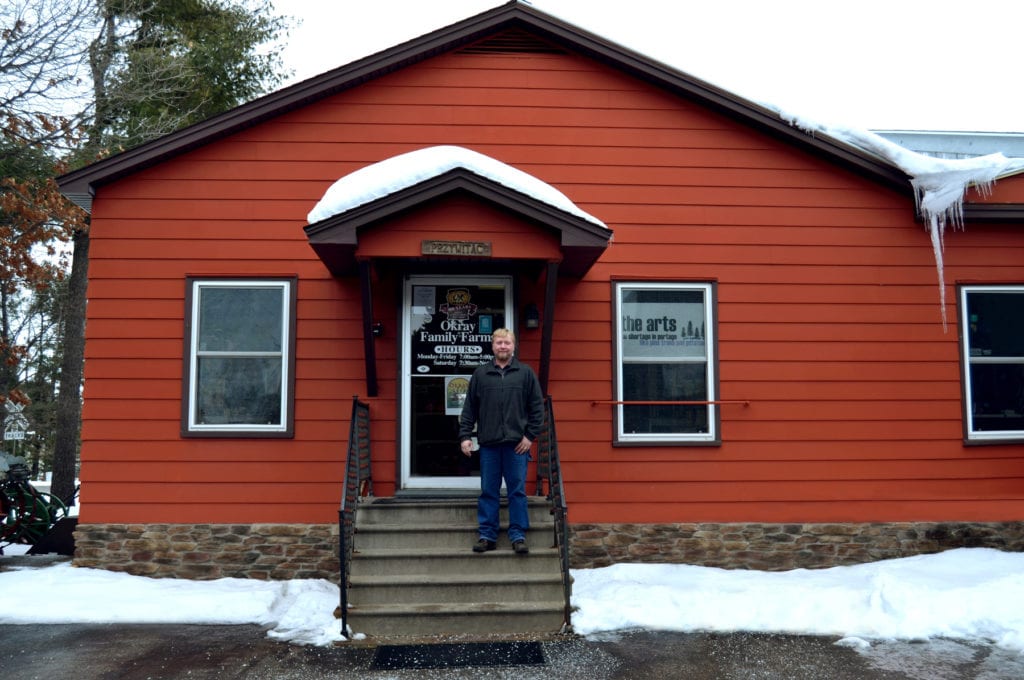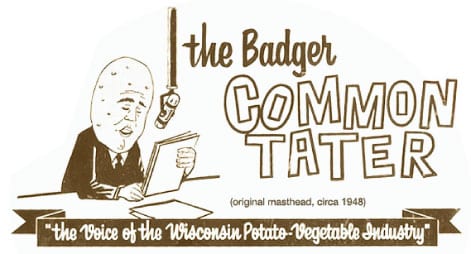
Mark Finnessy, new 2016 President of the Wisconsin Potato & Vegetable Growers Association (WPVGA) Board, assumes the reins of the position at a very volatile and demanding time for the industry, particularly in the battle for public perception.
Consumers are more interested than ever before in knowing where their food comes from – how it was grown, produced and processed and unfortunately, are getting their facts about agriculture, not from growers, the source, but often from activist groups outside of agriculture.
These groups normally do not rely on scientific facts but rather utilize fear-based tactics including exaggeration and continual repetition to promote a negative perception of agriculture.
The real story of agriculture is that it provides an abundant and safe source of food to an ever-growing global population, while also insuring good stewardship of the land.
Currently, however, WPVGA faces other massive challenges such as high capacity well legislation, which has grounded over 400 applications for new wells and countless other permits for repair/replacement of existing wells.

Additionally, the new Waters of the United States (WOTUS) rule worries growers, dairy producers and others, on and off the farm, because language in the rule like “neighboring, contiguous, bordering or significant nexus” to real waters of the U.S. leaves a lot of wiggle room for EPA to pick and choose their regulatory targets on a “case-by-case” basis.
Wisconsin Drainage Districts are experiencing problems with WOTUS right now as new legislation testing this ‘nexus’ language, promises to change 120 years of farm drainage systems with many districts experiencing a hold on permits for ditch repair and maintenance due to ‘perceived’ impacts.
Farms throughout Wisconsin depend on these ditches for water drainage, particularly in the Central Sands area, where lands will be flooded when spring rains hit if there is no drainage available.
Meanwhile, growers face increasing pressure regarding their use of GMO seeds, fertilizer and pesticide application and other factors vital to a healthy yield.

However, Mark is well suited to help address these issues through the WPVGA Board President’s position for which he has chosen to serve.
As Sales Manager for Okray Family Farms, Mark continuously deals with all levels of the industry from processors to the public who ultimately consume the operation’s produce.
Okray Family Farms grows thousands of tons of vegetables a year, raised on over 7,500 acres including 1,800 acres of a wide assortment of potatoes: reds, whites, russets and yellows, grown for the fresh market.
Son of former Okray Family Farms’ President, Mike Finnessy, Mark has grown up in the 110-year old Okray Family Farms business, which is continually growing strong, not just in produce but also in management and principles as evidenced in their slogan, “A Growing Company.”

Like many other members of the Okray Family Farms’ management team, Mark is involved in the industry at both state and national levels and is a Wisconsin representative for the United States Potato Board (USPB).
Prior to becoming WPVGA Board President, Mark was 2015 Vice-President and was active on the WPVGA Promotions Committee along with the Finance and Administration Committee.
This year, at the 2016 WPVGA Annual Banquet was named “WPVGA Young Grower of the Year.”
He was also a participant in the Potato Industry Leadership Institute and regularly attends the NPC DC Fly-In, where growers meet with members of Congress and lobbyists on Capitol Hill.
Mark recently attended the National Potato Expo where he and his father, WPVGA Hall of Famer Mike Finnessy, accepted the National Potato Council’s (NPC) and EPA’s Environmental Stewardship Award on behalf of Okray Family Farms.


According to NPC, Okray Family Farms, a member of the UW’s Healthy Grown Potatoes program, demonstrated its commitment to stewardship of the land and protection of the shared environment while producing high-quality potatoes.
They were also recognized for their outstanding achievement in reducing pesticides on the farm without compromising potato yield or quality.
Locally, Mark serves as President of the Plover Area Business Association (PABA) Board of directors, which fosters and advances business and community interests throughout the Greater Plover Area.
It will be a busy year but with the WPVGA organization and its members working together with other groups and interests to address the issues facing the industry, fair and equitable solutions may be reached.
Mark shares some of his thoughts and background within this interview as well as his 2016 WPVGA goals.
Preparing for the next generation is never easy within a farming operation but Okray Family Farms proactively made a concerted effort to ‘pass the baton’ during the last few years to ease this transition. Could you describe your role within the organization and detail how it has changed the last few years?

Originally, when I first started in the office, I worked in transportation and spent time getting to know customers and adjusting to working in an office environment.
It took about two years working under Mike, Dick and Walt and observing what they did, to familiarize myself with our customer base and the needs that we helped them fill.
Following Mike’s retirement in June 2015, I assumed the role of Secretary of Okray Family Farms and within the office, now work primarily in sales and human relations.
As mentioned previously, you were one of the recipients of the 2015 National Potato Council (NPC) Environmental Stewardship Award. What practices did you engage in and criteria did you meet to help you earn this award?
Okray Family Farms is dedicated to agricultural policies and practices that conserve environmental resources, promote food safety, protect human health and preserve the family farm.
Starting by employing thresholds established by UW Systems when spraying pesticides, we utilize strategies such as P-days forecasting tools, severity values and sweep counts.

We only apply chemicals that pose little to no threat to beneficial species and utilize a third party IPM specialist every season.
Our chemical classes are rotated regularly to mitigate the formation of resistance in pests and crops alike. A four-year rotation schedule is in place, rotating potatoes between sweet corn, green beans and peas.
We do not stop there either. Our employees’ safety is very important to us and all employees are licensed through the state with private applicator licenses.
They are trained annually and re-trained quarterly on safe chemical handling/disposal techniques. Most chemicals are not stored on site to reduce the risk of spills and contamination.
All wells are sampled and tested for bacterial content and nitrates annually to ensure that they are maintained properly and pose no risk of contamination.
We help prevent the leaching of fertilizer and pesticides into the groundwater through careful irrigation management practices.
Additionally, our state-of-the-art plant nutrition analysis techniques adjust fertilizer applications to meet the needs of the plants and avoid over-fertilization, further reducing the potential for nitrate leaching.
Soil conservation practices are one of our priorities as well. Tilling is only done when necessary and as minimally as possible to avoid over-working the soil.
Cover crops such as rye, Sudan grass and winter wheat are planted after the crops have been removed from the fields to help decrease erosion over the fall, winter and spring months.
Since 2000, we were one of the first farms to work with CWWP to plant over 25 miles of multi-species soft and hard wood windbreaks around our fields to greatly aid in the reduction of wind erosion and support beneficial insect species in our growing areas.

Wooded lands are maintained through MFL plans and prescribed cuttings to maintain natural habitats, encouraging wildlife proliferation.
Prescribed burns are done in conjunction with the International Crane Foundation to attract native species.
Banks of streams and ditches are continually repaired and restored to help retain the natural habitat of the organisms that live there.
As far as other pesticide risk reduction strategies, automated weather stations are utilized to predict pest outbreaks; thus, pesticides are applied only when and where needed.
Okray Family Farms has a strong commitment to research: pest-resistant plant cultivars are studied and reviewed yearly and we strongly consider leading candidates. In a pilot program with the Wisconsin Institute for Sustainable Technology, the farm has also planted grapes to extract resveratrol, which shows promise for cancer-fighting abilities.

Water is essential to our operation and we respect it and use it wisely and responsibly. Our soils are carefully mapped so we can determine specifically how much irrigation is needed when and where, so irrigation can be delivered with pinpoint accuracy.
Our farming is now more data driven than ever before. We use many GPS-driven technologies to fine tune how things are grown, which helps minimize our ‘footprint’ on the environment.
Sustainability is not just a ‘buzzword’ with us. It is a continuous way of farming that is constantly evolving as new practices and concepts are tested and once proven, integrated into our everyday procedures.
As a long-time proponent of conservation and sustainability, what practices do you urge other growers to pursue in their quest to become even greater ‘good stewards of the earth’?
Our variable rate irrigation is very important and has led to much more efficient water applications.
Moisture sensors detect areas of fields that may require more or less water and the rate or irrigation is adjusted to match the needs of the land and the crop.
Soil mapping technology is another tool that increases ‘good stewardship’.

Soil mapping identifies properties like organic carbon content, clay content, water table locations, native nutrient potential, catatonic exchange and more.
This categorized information helps highlight high and low yielding areas, determines how much water the soil will store after rainfall and how fast you could expect runoff.
This information can impact how growers manage their land and their crops in order to decrease costs and increase profitability.
I would like to see wider-spread implementation of these tools and techniques going forward.
As President of the WPVGA Board, please share with us, the goals you would like WPVGA to achieve during your tenure in office.
WPVGA members have been working with a number of organizations and individuals for over a year to get the State of Wisconsin legislature to pass a fair and appropriate high capacity water bill that addresses the creation of new wells and repair/replacement of existing wells.
We have made progress towards this goal but need resolution of this issue. The lack of a definitive water bill is devastating our industry and will result in adverse economic impact for Wisconsin.

Getting this issue resolved is my top priority.
I also recognize the need to increase general membership and member involvement on committees as well as spread knowledge of the positive points of our industry to the younger generation so that we encourage them to stay in the Ag world.
Beyond water issues, what other problems affecting WPVGA growers loom on the horizon for 2016?
To me, the second biggest issue facing the Ag industry is employment – finding the right people to work in the various positions that occur on an annual basis.
We are finding that as the younger generation enters the workforce, it gets harder to find people who are looking for work in our areas of greatest need – manual labor, machine operation, etc. Meanwhile, as our farm worker population ages, more and more of these positions remain empty.
It is particularly difficult to fill semi-truck driver positions. The requirements for obtaining and keeping a CDL license grow increasingly complex with each year, making it harder and harder to acquire a license.

What do you see as the biggest obstacles to the future of the potato and vegetable industry and what recommendations do you have to address these obstacles going forward?
Currently, the UW Cooperative Extension is faced with a permanent $3.6 million annual base budget cut to their state funding.
Even though no positions will be eliminated immediately, a cut of this magnitude will create changes and reorganization, beginning as early as this summer.
I think it is critically important to maintain the great relationship we have cultivated with the UW Cooperative Extension system and other Ag-related UW departments, which includes help with funding when possible to keep the UW working with and for us going forward.
What do you appreciate most about your involvement with WPVGA and what would you recommend to other growers as far as involvement/participation in WPVGA/other associations, local activities and legislative action?
WPVGA is a fantastic network building resource. The connections I have made with other growers and Associate members are phenomenal.
We are privileged to have some of the smartest minds in agriculture working with us through UW’s staff and our own grower and Associate members as well as the many related organizations who sit with us on many committees and task forces.

I would urge growers and all members to use these people as a resource, through phone calls, emails, questions, general meetings attendance, individual consultation, etc.
I am thankful to be able to work in the Plover area and I try my best to give back to the community by participating in Plover Area Business Association events, area fundraisers, and other activities. I feel you get back as much as you put in.
This is a time when it will require as many Wisconsin potato and vegetable growers as possible to band together to address universal issues that affect them as a whole. What suggestions might you have to help more growers join the organization and become more active in these issues?
My recommendation to other growers would be to be willing to put yourself out there if you want to see anything change. It takes involvement from everyone to get anything done, especially in government and politics, and helping merge into a united front will help us all accomplish more of our goals.
We, as an industry, need to do a better job of telling our story to the general public who has a genuine appetite to hear what we have to say.

If you are not on social media, do not have a website, blog page or create videos, you may want to consider these tools as an alternative and effective means to communicate with the public.
You can share what goes on in your daily growing schedule, provide updates, research and development news, tips, techniques and share your overall pride in your industry. Tell them about your planting, cultivating and harvest, educating them as to the tremendous effort involved in raising a crop.
Additionally, encourage related growers and businesses, who are not active in WPVGA, to join the organization. Share with them the benefits you enjoy in your interactions with WPVGA.


